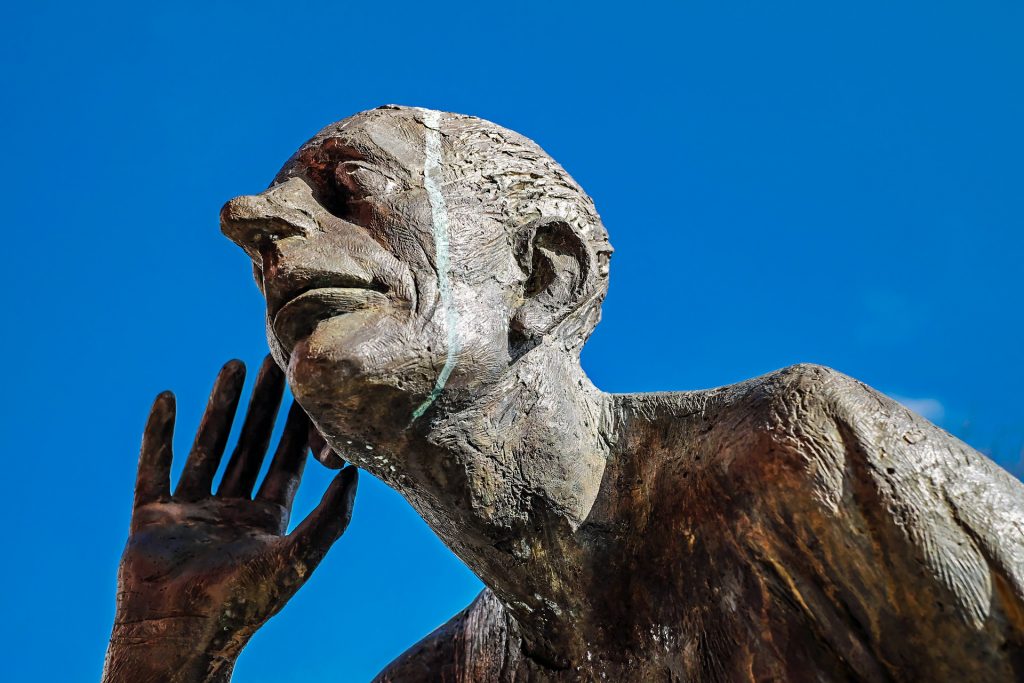
Two friends met.
“Keep your distance, I’m sick!” one of them exclaimed.
“Then watch out”, the other replied. “I’ve got contagious health!”
(Stefan Hammel, The Blade of Grass in the Desert, p. 51)


Two friends met.
“Keep your distance, I’m sick!” one of them exclaimed.
“Then watch out”, the other replied. “I’ve got contagious health!”
(Stefan Hammel, The Blade of Grass in the Desert, p. 51)

Mon ami Charles Naceur Aceval, un raconteur algerien a traduit ma petite histoire “L’odeur du pain” et il l’a combiné avec les mémoires des odeurs de son enfance. Un conte des odeurs aimées…
(inspirer de l´ouvrage de Stefan Hammel « Der Grashalm in der Wüste »)
Les odeurs ! Ah les odeurs de mon enfance ! Elles collent à mon âme. Parfums de mon pays, ma région, ma mère, ma grand-mère, ma terre natale. Toutes ses odeurs à jamais fixées en moi ont construit une bonne partie de ce que je suis. De toutes ses senteurs, je voudrai vous parler de trois d´entre elles. Celles que je fais revivre continuellement comme un rituel. Surtout parce qu’elles émanent de ma mère que je sens toujours à mes côtés. « Une personne ne meurt que lorsqu´elle est oubliée ! » dit un proverbe nomade.
La première est l´odeur du café.
Elle me renvoie à l’image de ma mère assise par terre en tailleur sur une peau de mouton, et torréfiant le café dans un torréfacteur cylindrique en aluminium. De temps en temps, elle prélevait un grain de café, le mettait dans sa bouche pour le croquer. C’était ainsi qu’elle évaluait la torréfaction. Une fois le café torréfié à point, elle nous donnait à ma soeur Nora et moi le petit moulin manuel à café. Et tour à tour nous tournions avec effort la manivelle qui nous renvoyait le doux bruit du grain qui s’écrasait pour tomber en poudre dans un petit tiroir au bas. Une fois le café moulu, ma mère prenait dans le creux de la paume de sa main une petite quantité de poudre, y ajoutait une pincée de sucre et d’un geste versait le petit tas dans sa bouche. C’était ainsi qu’avant la forme liquide, elle dégustait le café.
Ce n´est qu´après qu´elle mettait le reste dans le haut de la cafetière, la partie filtre, et passait l’eau frémissante qui laissait couler le café. Des effluves bien spécifiques embaumaient l’air et nos narines. Dans le Sni, plateau en cuivre, elle alignait les petites tasses et posait à côté, le Tbag, plat en alfa, garni de tranches de M´bessess (pain de semoule beurré et grillé). Nous nous régalions alors sous l’oeil tendre de notre mère.
Mon deuxième souvenir d’odorat est celui de l´encens.
Un véritable rituel mystique pour chasser le mauvais oeil et les mauvais esprits. Dans un braséro en terre cuite, maman allumait du charbon et lorsque la braise prenait elle y jetait une pincée d’encens. Puis tenant le braséro fumant dans les mains, elle se promenait dans toute la maison, pièce après pièce, elle encensait les lieux en marmonnant quelques formules en directions des esprits et des
invisibles de la maison. Sans oublier les toilettes, car c´est là que se trouvent les
mauvais esprits. Puis elle posait le braséro à terre, elle l’enjambait et demeurait
debout au-dessus, un pied de chaque côté. C’était alors que la fumigation se
réalisait sous sa robe pour une purification du corps par le bas. Un mystère que
cet acte magique et touchant à la personne même.
Enfin, l´odeur du pain.
C´est l´odeur du pain, qui convoque le plus de souvenirs liés à ma mère. C’est
ma « madeleine de Proust » ! Comme par magie l’odeur du pain chaud me
projette pour un voyage dans le temps et l’espace.
Dans mon enfance, nous avions souvent faim. Ce n’était pas la misère mais la
nourriture était rare et précieuse. Et l´odeur du pain pétri par ma mère et sorti
du four banal, annonçait le grand régal. Le pain est un symbole sacré dans
plusieurs cultures et en Algérie, on l’aimait et le respectait. Pas une miette ne
se perdait, et surtout, ô sacrilège, ne se jetait !
Lorsque la tristesse me submerge, lorsque rien ne se passe, rien ne bouge,
lorsque le temps s´arrête, je prépare un pain et l´odeur se propage dans tous
les recoins de la maison. Là, comme par enchantement, tout devient vivant. Un
sourire sur les lèvres, une larme sur la joue, je revis et ma mère revient à mes
côtés.
Une histoire me revient. Une histoire qui a le parfum du feu de bois. Au temps
où la modernité et l´électricité n´avaient pas atteint les campagnes. Dans un
petit village vivait un boulanger seul avec sa femme. Son pain était apprécié de
tous, et même les gens des villages avoisinants n´hésitez pas à faire un long
chemin pour acheter le bon pain.
Un jour le boulanger dit à sa femme :
Sa femme répondit :
Après que la nouvelle soit répandue dans le pays, quatre jeunes garçons se présentèrent chez le boulanger. Ce dernier ne savait lequel des quatre choisir. Il demanda conseil à sa femme qui lui dit :
Ainsi, fut fait. La femme du boulanger posa alors une question au premier jeune :
Il lui répondit :
Au second, elle posa la même question. Celui-ci expliqua :
Le troisième répondit :
Lorsque le quatrième pénétra, avant même qu´elle ne lui posa la question, elle dit à son mari :
Etonné le boulanger demanda :
La femme expliqua :
Ainsi pour moi l’odeur du pain, est devenue un monde où toutes les odeurs renvoient à la mémoire de l’âme. Et la mémoire est le bien précieux de chacun, celle que personne ne volera à personne et cela jusqu’au jour dernier. Personnellement, ces parfums sont ma mémoire et ma mémoire aide mon être à voler par l’odorat sur les ailes du temps et de l’espace.
Mon bonheur est de ces petites choses qui comme le soupirail de Rimbaud donnent à rêver.
Je suis un orphelin heureux car je peux jouir des produits d’où viennent mes odeurs et revivre ces moments heureux avec ma mère.
Aceval Charles

The story “The Replanted Tree” is designed in particular for children finding
it hard to come to terms with a new living situation after a house move
or adoption, or after their parents have divorced and the family has been
restructured. Once again, it is a good idea to refer to a minor injury in the
story in order to incorporate the problem which the listener is facing and its
predicted improvement without lending too much gravity to the story (and by
analogy to the way in which the patient handles the associated situation in his
or her life). The story can also be used for patients who are forced – for agerelated
or health- related reasons – to move out of their own house in order to
go and live with family or in a home, or adults with disabilities who are forced
to move away from their families and into sheltered accommodation.
One day a gardener was working in his garden when he found a small tree
right in the middle of some shady undergrowth. “A shadbush!” he cried.
“How on earth did that get here?” He would never have suspected that
such a beautiful and valuable tree could be found in such a dark location.
Perhaps the wind or a bird had carried its seeds there?
The gardener thought carefully about what he should do next. He
knew that it is sometimes diffi cult to move a plant to a different location,
but he also knew that his shadbush would never grow into a large, strong
and beautiful tree if it stayed here in the shade. So he decided to replant it
in a different location, where it would get enough sun and wind to thrive
and fl ourish. He took his spade and dug out a broad ring of soil around
the trunk of the tree before digging a hole in the ground where he wanted
the tree to grow and placing the shadbush there, root ball and all. He then
fi lled the hole back up with soil, added exactly the right amount of fertiliser,
and gave the plant a good watering.
When he looked at his tree the next day, he was dismayed to see that all
the leaves on it were drooping. He thought to himself that the tree’s roots
had probably extended a long way under the ground before it had been
dug up, and that it must have lost some of its tiniest hair- like roots. The
tree would need to conserve its energy to heal these injuries, but it should
be able to regrow its roots, and so the gardener decided to give his tree the
best possible care and simply be patient. He waited and gave the tree all
the time it needed, and soon the leaves had indeed regained their former
strength. After a few months the tree was a fi ne specimen, and after a few
years it had grown into a large and strong tree.

Here is a story about “the replanted tree” (Stefan Hammel, Handbook of Therapeutic Storytelling), translated into Swedish by my colleague Viktoria Carlsén.
En dag när trädgårdsmästaren arbetade i sin trädgård så hittade han ett litet träd, mitt i den skuggigaste delen. ”En häggmispel!” ropade han. ”Hur i hela friden har den hamnat här?”. Han hade aldrig kunnat tro att ett sånt vackert och värdefullt träd skulle kunna finnas i en sån här mörk plats.
Kanske hade vinden eller en fågel burit med sig frön hit?
Trädgårdsmästaren funderade noga ut vad som skulle bli hans nästa steg. Han visste att det ibland var svårt att flytta en planta till en annan plats, men han visste också att häggmispeln aldrig skulle kunna växa till en stor, stark och vackert träd om det stannade kvar i skuggan. Så han bestämde sig för att omplantera trädet till en ny plats, där den skulle få tillräckligt med sol, vind och kunna frodas och växa.
Han tog sin spade och grävde en vid ring runt trädet innan han grävde en grop där han ville att trädet skulle växa och planterade sedan trädet där med rotklumpen och allt. Han fyllde sedan igen hålet med jord och exakt rätt mängd gödsel och vattnade plantan rejält.
När han tittade till plantan nästa dag blev han bestört av att se att löven hängde på trädet. Han tänkte för sig själv att trädets rötter hade säkert sträckt sig långt under marken tidigare innan den blivit uppgrävd och att några av de pyttesmå rötterna måste blivit kvar. Trädet skulle behöva bevara all sin energi för att läka sina skador, och rötterna skulle återigen kunna växa ut.
Trädgårdsmästaren bestämde sig för att ge trädet den allra bästa omvårdnaden det behövde och att och ge allt tålamod som behövdes. Han väntade och gav trädet all tid den behövde, och snart började löven återfå sin forna styrka.
Efter några månader var trädet ett vackert exemplar, och efter några år hade det vuxit till ett stort och starkt träd.
Översättning: Viktoria Carlsén

The story “Hypnotising Dogs” is also designed to cure the symptoms of travel sickness, since what’s good for dogs is also good for humans. The method involves refocusing attention from bodily experiences to the hearing, relieving anxiety and stress through a relaxation trance, and producing heart and breathing rates which are similar to those experienced during sleep and are wholly dissimilar to those experienced during attacks of nausea. The procedure is also suitable for infants, dementia patients, coma patients, people with severe mental disabilities and other people with whom verbal communication is not possible.
I recently took a coach trip with a group of family members, including Luna the labrador. “She feels sick,” said my sister-in-law. “She’s already retched several times. She doesn’t like travelling by car because it sometimes makes her vomit. Can’t you hypnotise her so that it doesn’t happen while she’s in the coach with us?” I talked to Luna for a while and then asked my nephew Nikolas: “Would you lend Luna your MP3 player? Find some peaceful music – a lullaby or something similar. Set the volume very low, and place the headphones on Luna’s ears.” Nikolas found a band whose music was suitable and put the headphones over Luna’s head. After half a minute or so, Luna relaxed and lay down, and was soon asleep. Her symptoms of nausea did not reappear.

Stefan Hammel (Germany) and Marie-Jeanne Bremer (Luxembourg) are organizing the 3rd International Festival of Therapeutic Storytelling in Otterberg, Germany on Oct 15th – 18th, 2020.
The convention languages are in German and English. At the moment information in the www. is available in German [Link website].
However, if you consider to come, don’t hesitate to contact us (e-mail-Adress ifte@hsb-westpfalz.de) and we can figure everything out so you can join us.
Here’s the story of the salmon in English (Stefan Hammel, Handbook of Therapeutic Storytelling, p. 193f.)
A salmon was travelling along the annual salmon run, further and further upstream. He had leapt up rapids and jumped over enormous boulders – and even used all of his power and skill to ascend waterfalls. “Not long now,” said the salmon to himself at last. “I remember being here before – I passed it on my first evening on the journey down. I’m much larger and stronger now, and I’ll have reached my destination in just a few hours.” The salmon redoubled his efforts, wanting to make faster progress. But as he did so, the current also seemed to become stronger. The path down the river had seemed easy, but the way back seemed pure torture. Sometimes he was too tired to swim, often he lacked the concentration to jump properly, occasionally he had to swim around the rods and creels of the salmon fishers and once he even had to avoid the paw of a hungry bear. Again and again he stopped to regather his strength, but the river kept on flowing to the sea. By the evening the salmon noticed that he had not made any progress – if anything, he had gone backwards. Sad and disappointed, he found a protected spot between two boulders on the bank. He thought to himself, “It must be possible to reach my destination – others before me have managed it. But how?” Then the clever fish had an idea. “I’m not going to try and get there as quickly as possible any more; I just want to make progress. All I will ask of myself is to get a little bit closer to my goal every evening than I was in the morning, and if I do that day after day I’ll eventually reach my destination. As long as I’ve made some progress by every evening, it won’t matter how short a distance I’ve travelled – even if it’s only half an inch.” The salmon plucked up his courage and started again. Some days he barely made any progress at all, but mostly he travelled much further than he expected – and if he didn’t, he remembered his resolution and was content with what he had managed. After a few weeks, he reached his destination; a lake near the source of the river. He looked around, and found that only a few other salmon had reached the lake before him – most were still trying to reach their destination in the shortest possible time.

The story “Hearing Difficulty” picks up on the fact that tinnitus sufferers often focus their attention on the wrong thing. It can be used not only in connection with tinnitus, but also as a metaphor for many other internal and external conflicts.
I remember a particular teacher who taught me when I was at school and whose lessons seemed to me both easy to follow and informative. Then one day another pupil pointed out how often she ummed and ahhed while she was talking, and that ruined everything. Up until then I had been able to listen to her words and had not even noticed the hesitations, but from then on I could only hear, “um…. ah….. um.” The words that she said were nothing but pauses between the sounds.

“The Hindenburg Path” describes a dialogue which appears to make no sense because one of the interlocutors is hard of hearing.
People suffering from a hearing impairment may seem odd (unapproachable, indifferent, arrogant etc.) and be treated accordingly, which may mean that they increasingly grow to resemble the mistaken image which others have of them. The same applies to people who find it difficult to communicate because they grew up speaking a different language. In the situation described in the story, the problem is probably a result of the man’s efforts to avoid loneliness by attempting to communicate in spite of his hearing impairment. The story reflects the general principle that “odd” behaviour often turns into “ordinary” behaviour once we are aware of its context.
Mr Neumann greeted Mr Krauss, an elderly man who lived nearby. “Hello, Mr Krauss” “Hello… and where have you come from?” Mr Neumann pointed in the appropriate direction and replied, “From down there.” “Oh, the Hindenburg path.” “The Hindenburg path? Why’s it called that?” “It’s so steep you can’t go up it.” “I see. But what does that have to do with Hindenburg?” “Haven’t you ever heard of the enormous Hindenburg airship…!”

The story “Blinded by Love” is an example of a minimal conversion disorder, and can be told e.g. to people experiencing a psychological crisis and suffering from symptoms relating to perception or mobility.
As I walked through the pedestrian zone, I wondered why I was finding it so hard to see things. What could be wrong with me? A delayed effect of the laser eye surgery I had undergone last autumn? My vision was normally 20/20, and I couldn’t understand it. When I was driving on the motorway that evening, I strained my eyes to peer through the windscreen and find the best angle of vision. Where had all the cars gone? What on earth was going on? The answer was supplied by my friendly unconscious. I had just spent three days at a conference on trauma which had involved a lot of biographical work, and I had also fallen for a woman who was not interested in me. As soon as I asked myself, “What am I finding so difficult to look at?” the visual impairment disappeared. Things like this happen, and more often than you might think